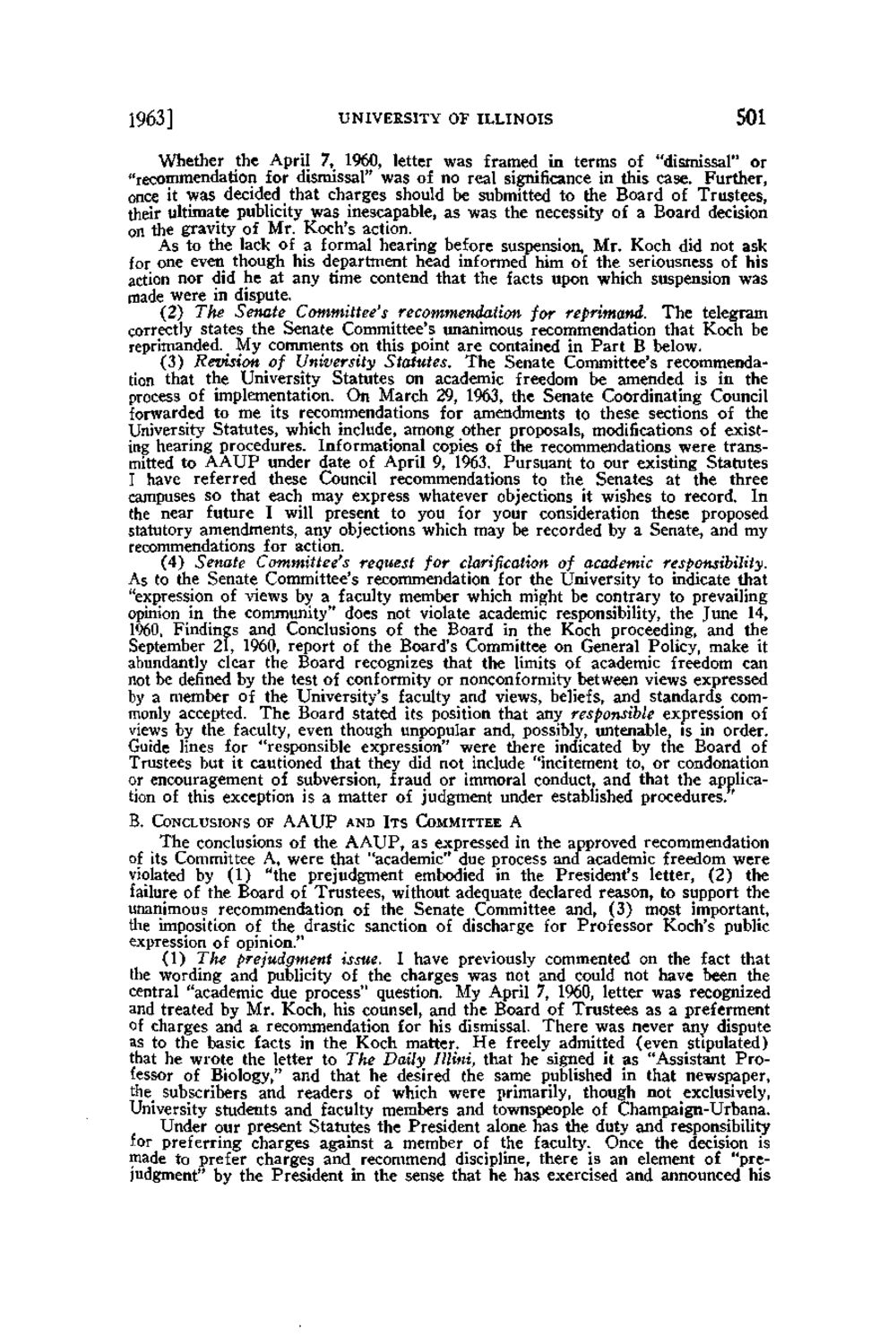| |
| |
Caption: Board of Trustees Minutes - 1964
This is a reduced-resolution page image for fast online browsing.

EXTRACTED TEXT FROM PAGE:
1963] UNIVERSITY OF ILLINOIS 501 Whether the April 7, I960, letter was framed in terms of "dismissal" or "recommendation for dismissal" was of no real significance in this case. Further, once it was decided that charges should be submitted to the Board of Trustees, their ultimate publicity was inescapable, as was the necessity of a Board decision on the gravity of Mr. Koch's action. As to the lack of a formal hearing before suspension, Mr. Koch did not ask for one even though his department head informed him of the seriousness of his action nor did he at any time contend that the facts upon which suspension was made were in dispute. (2) The Senate Committee's recommendation for reprimand. The telegram correctly states the Senate Committee's unanimous recommendation that Koch be reprimanded. My comments on this point are contained in P a r t B below. (3) Revision of University Statutes. The Senate Committee's recommendation that the University Statutes on academic freedom be amended is in the process of implementation. On March 29, 1963, the Senate Coordinating Council forwarded to me its recommendations for amendments to these sections of the University Statutes, which include, among other proposals, modifications of existing hearing procedures. Informational copies of the recommendations were transmitted to A A U P under date of April 9, 1963. Pursuant to our existing Statutes I have referred these Council recommendations to the Senates at the three campuses so that each may express whatever objections it wishes to record. In the near future I will present to you for your consideration these proposed statutory amendments, any objections which may be recorded by a Senate, and my recommendations for action. (4) Senate Committee's request for clarification of academic responsibility. As to the Senate Committee's recommendation for the University to indicate that "expression of views by a faculty member which might be contrary to prevailing opinion in the community" does not violate academic responsibility, the June 14, 1960, Findings and Conclusions of the Board in the Koch proceeding, and the September 21, 1960, report of the Board's Committee on General Policy, make it abundantly clear the Board recognizes that the limits of academic freedom can not be defined by the test of conformity or nonconformity between views expressed by a member of the University's faculty and views, beliefs, and standards commonly accepted. The Board stated its position that any responsible expression of views by the faculty, even though unpopular and, possibly, untenable, is in order. Guide lines for "responsible expression" were there indicated by the Board of Trustees but it cautioned that they did not include "incitement to, or condonation or encouragement of subversion, fraud or immoral conduct, and that the application of this exception is a matter of judgment under established procedures." B. CONCLUSIONS OF A A U P AND I T S COMMITTEE A The conclusions of the A A U P , as expressed in the approved recommendation of its Committee A, were that "academic" due process and academic freedom were violated by (1) "the prejudgment embodied in the President's letter, (2) the failure of the Board of Trustees, without adequate declared reason, to support the unanimous recommendation of the Senate Committee and, (3) most important, the imposition of the drastic sanction of discharge for Professor Koch's public expression of opinion." (1) The prejudgment issue. I have previously commented on the fact that the wording and publicity of the charges was not and could not have been the central "academic due process" question. My April 7, 1960, letter was recognized and treated by Mr. Koch, his counsel, and the Board of Trustees as a preferment of charges and a recommendation for his dismissal. There was never any dispute as to the basic facts in the Koch matter. H e freely admitted (even stipulated) that he wrote the letter to The Daily Illini, that he signed it as "Assistant P r o fessor of Biology," and that he desired the same published in that newspaper, the subscribers and readers of which were primarily, though not exclusively, University students and faculty members and townspeople of Champaign-Urbana. Under our present Statutes the President alone has the duty and responsibility for preferring charges against a member of the faculty. Once the decision is made to prefer charges and recommend discipline, there is an element of "prejudgment" by the President in the sense that he has exercised and announced his
| |